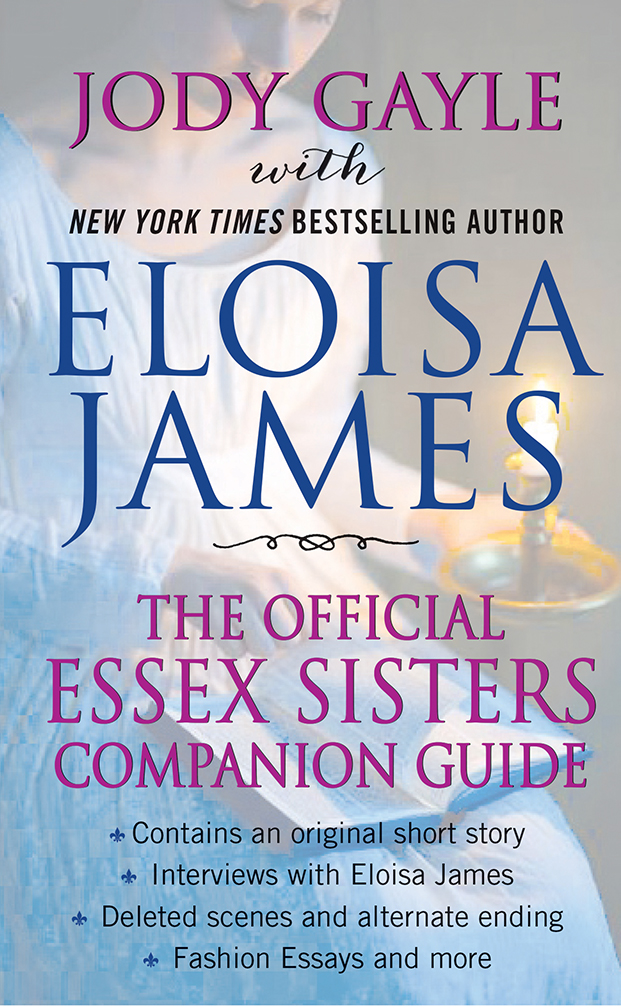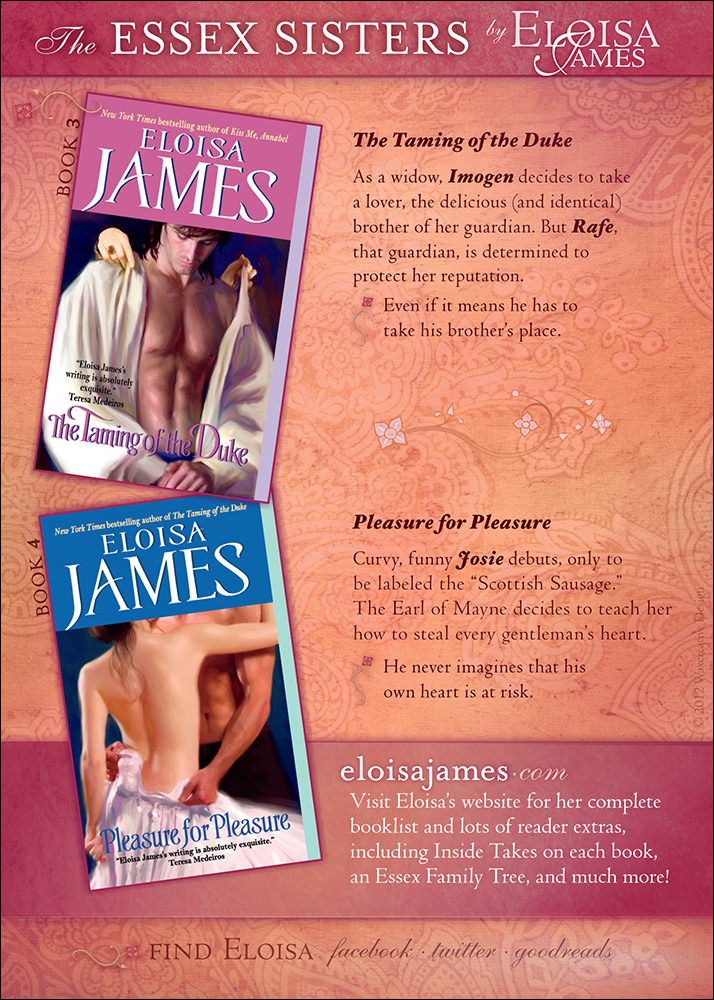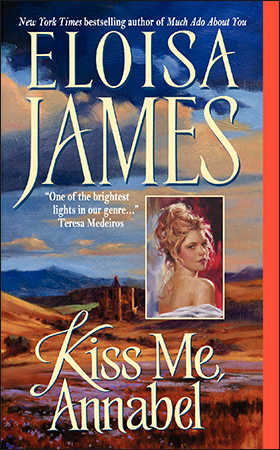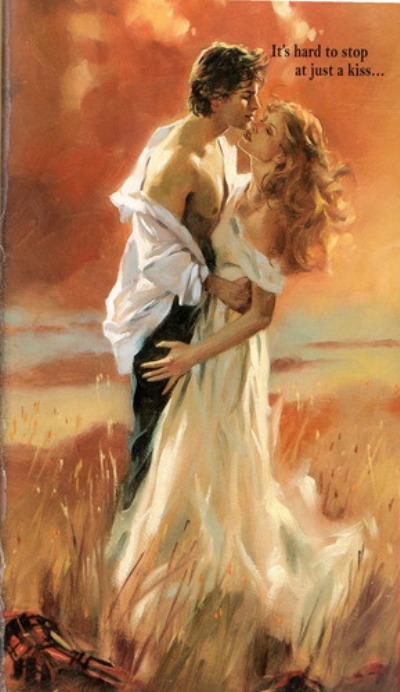
Bookcode: kiss
Essex Sisters Series Crossword Puzzle
What IS the Essex Sisters Companion Guide, exactly?
It’s a present for all my readers who loved the Essex Sisters—my series about four Scottish girls who find themselves orphaned and under the care of a drunken, rascally duke. But in reality, you don’t need to have read those books—or remember them—to enjoy this book.
Do you love history? The Companion includes essays about fashion, newspapers, gambling, theater and more.
Do you love my novellas? There’s a novella here that you can’t get elsewhere! “A Midsummer Night’s Disgrace” is pure pleasure in a small package—the story of a young lady who’s made up her mind to rebel!
Are you interested in how romance novels are constructed? I wrote a 100-page essay that traces this series from its very first idea right through editing, copyediting, making the cover, and more.
Are you curious what the first version of Kiss Me, Annabel looks like? Here, for the very first time, is a 140-page alternate ending to this popular novel. It’s the novel the way I initially constructed it—a passionate, darker version of the novel you can read in publication. Read them both and see which one you like best!
So, in short, the Companion is over 500 pages of fascinating fiction and history, the perfect gift for a writer, reader, or yourself!
Essex Sisters Collectible Card
The covers of each of Eloisa’s series are grouped together into gorgeous collectible cards. In addition to this card for the Essex Sisters, there is a card for Eloisa’s Fairy Tales, Desperate Duchesses (the Original Six), and the Duchess Quartet.
Note: Collectible cards are no longer available.
Kiss: NYT bestseller
#23 on the New York Times bestseller list.
Kiss: Walmart bestseller
#10 on the Wal-mart mass market bestseller list.
Kiss: Waldenbooks bestseller
#5 on the Waldenbooks bestseller list.
Inside Kiss Me, Annabel
- Annabel is the second of the Essex daughters to marry; her eldest sister Tess married in Much Ado About You. In that book we learned quite a lot about her husband, Lucius Felton, which explained precisely why he acts with such prompt generosity in this book. Lucius will always use his financial resources to find an intelligent way out of a problem, although of course he had no way of knowing that Annabel did not wish to end her marriage.
- Imogen appears in Much Ado About You. When Kiss Me, Annabel begins, she is grieving, and channels that grief into anger. I watched a friend find her way through the early stages of grief in a similar fashion…it’s a hard way to find peace.
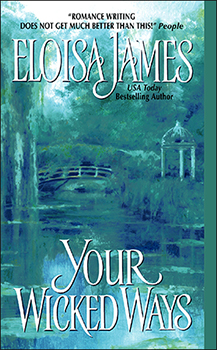
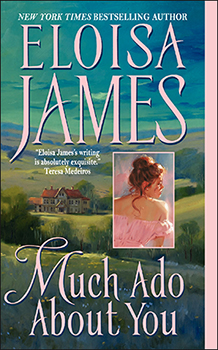 Mayne first appeared in Your Wicked Ways. Then he cropped up again, like a bad penny, in Much Ado About You…and yes, I did write his story, Pleasure for Pleasure!
Mayne first appeared in Your Wicked Ways. Then he cropped up again, like a bad penny, in Much Ado About You…and yes, I did write his story, Pleasure for Pleasure!- The ballad about widows that Griselda quotes comes from a collection of Renaissance songs. There were many songs (and plays) about lusty widows. It seems that Renaissance women didn’t always want to marry again, since they would have to give up the right to manage their own estates…and yet they wanted companionship. Well, who can blame them?
- Josie talks of quinces as a meal for a bride…the custom goes back to the times of the Greeks and Romans. A quince was likely the “golden apple” that Venus was given by Paris (he gave the golden apple to the fairest goddess…a gift that started the Trojan War). So Venus is often depicted with a quince in her hand.
- The tradition of blackening a bride with molasses and feathers certainly existed in the Highlands. I rather doubt that a future countess would have faced the likelihood, but I needed Ewan to face his greatest fear – that something akin to what happened to Rosy would happen to Annabel. I didn’t do it just to be cruel to my hero; men are slow to articulate their feelings, and Ewan always has to be forced into discomfort or rage before he expresses himself.
The Essex Sisters Family Tree
Interested in knowing how many children the Essex sisters had? Eloisa has this beautiful Essex Family Tree for you to see.
Click to see a bigger version that can be printed if you’d like.
Mea Culpa, Kiss Me, Annabel
- Oops, I forgot to give poor Ewan a birthdate! Lovely reader Jacquie did the math and decided he must have been born in 1784.
- Stephanie notes that on page 209 Griselda stares down at Mayne with “all the arrogance of an elder sister.” Of course – as is made clear many times elsewhere – Griselda is younger than Mayne. Not that it would make her any less arrogant, Eloisa adds (who happens to be privileged with three younger, arrogant siblings).
- Joanne pointed out that in the Historical Note, I admit to having made Tess churn butter; that should have been Annabel, of course (are you starting to see that I have a problem with names?).
- Lili was the first to notice that on on page 279, 4th paragraph, second sentence, “Anna” should have been Annabel.
- And Michelle was the first to tell me that on page 371, line 14, Ewan says he loves “Gregory and Annabel and Nana.” Of course, it should have been “Gregory and Rosy and Nana”!



